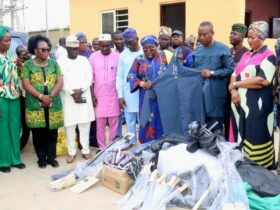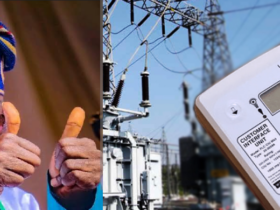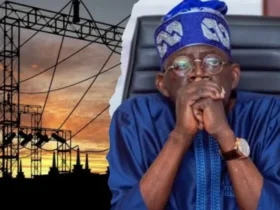
The Minister of State for Petroleum Resources, Heineken Lokpobiri, has revealed that the recently inaugurated Dangote Petrochemical Refinery, Port Harcourt Refinery, Warri Refinery, and modular refineries in Nigeria may face challenges in acquiring sufficient local crude oil for petroleum product production unless there are deliberate efforts to boost investments and crude production in the sector.
Lokpobiri underscored that unless the country increases production by engaging capable investors in managing its oil wells, the refineries will struggle to obtain enough feedstock for adequate oil production, even for domestic consumption.
On January 12, the Dangote refinery announced the commencement of diesel and aviation fuel production. Situated in Dangote Industries Free Zone, Ibeju-Lekki, Lagos, Nigeria, the Dangote refinery, a subsidiary of Dangote Industries Limited, operates as a 650,000 barrels per day crude oil refinery.
By January, the facility had received six shipments of one million barrels each of crude oil from the Nigerian National Petroleum Company Limited.
Shell Nigeria Plc recently reported the completion of supplying 450,000 barrels of crude oil to the newly rehabilitated Port Harcourt refinery.
Nevertheless, major and independent marketers have yet to receive refined products from any of the refineries, as the Nigerian National Petroleum Company Limited continues to import fuel amid scarce foreign exchange.
Speaking at the seventh edition of the Nigeria International Energy Summit held in Abuja on Tuesday, the minister highlighted that the Dangote refinery alone would require up to 650,000 barrels of crude oil daily, while government-owned refineries would consume about 450,000 barrels as well.
According to him, Nigeria has in the last five years slowed down investments, saying “We are the lowest in the world, if you talk of investment to reserves ratio, Nigeria is 25 per cent. Nigeria is the least in the world. Between 2017 and 2022, if you look at the figures, Nigeria’s investments compared to our reserves is 25 per cent. There is something we are not doing right.”
He expressed regret over the fact that numerous oil wells have been abandoned despite the declining production of crude oil.
“We need to ramp up production, there are so many idle wells that we can give to the right people. We need to ramp up production in the upstream, so that the midstream and the downstream can also be successful. We need to increase our production in the upstream so that we will be able to produce the right quantity that will service our obligations, both locally and internationally.
“Dangote Refinery needs about 650,000 barrels a day; we are rehabilitating our government-owned refineries which may need about 400,000bpd. We have a couple of modular refineries coming up. On the whole, we need to ramp up production so that we will be able to meet our domestic needs and to guarantee energy security,” Lopkobiri explained.
He maintained that without the country’s investment, the envisioned shift from fossil fuels to gas would remain an illusion.
The oil minister expressed the view that Nigeria shouldn’t rely on fuel imports, highlighting worries about the significant portion of the country’s foreign exchange devoted to fuel importation.
“We must find a solution to our forex problem. Nigeria has no need importing fuel. We should free our scarce forex for other sectors of the economy. I am aware that the bulk of our forex goes to the importation of refined oil products. But now, we are rehabilitating our own refineries, which will come into full operation by the end of this year.
“Port Harcourt refinery’s first phase has started; Warri refinery is about to be completed between now and the next two months, Kaduna will come; all will be rehabilitated this year. Even after rehabilitation, if we do not ramp up production, if we do not get the right investment, we won’t be able to get the feedstock,” he said.
The ex-Senator pointed out Nigeria’s energy poverty, despite its vast reserves of oil and gas.
He pointed out that unlike the Middle East, where such resources have led to economic prosperity, Nigeria has not experienced similar benefits.
“We need to unravel what other climes have done to bring economic prosperity to their nations that we have not done. If you have reserves underground and you don’t bring them out, they won’t translate to anything.
“We need to give it to those who have the proven capacity to explore oil and gas for the benefit of Nigerians and the global energy landscape. In the past, the allocation of blocks was politicised. The easiest way to guarantee energy security is to get the right investment,” the minister added.
READ ALSO: Fuel: Dangote Refinery To Deliver In Weeks
Addressing the topic of energy transition, Lokpobiri aligned with the Organisation of the Petroleum Exporting Countries in opposing the proposal to cease investments in fossil fuels. He pointed out that the West urges Africa to halt such investments while it continues its own fossil fuel investment unabated.
“We will transit at our own pace. Our target is to explore these resources in a more environmentally friendly way. We are not stopping it, we need the money to be able to transit, and for us to transit, we must get the right investments,” he said.









Leave a Reply